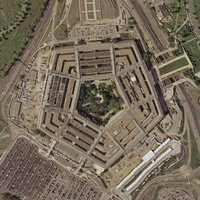We have long known that retired military officers have a cozy relationship with the military-industrial complex. A recent article in the Boston Globe fleshed out the nature of this relationship, detailing the extent to which retired senior officers have moved to private-sector defense companies in the last decade. Indeed, this career path has become considerably more common: "From 2004 through 2008, 80 percent of retiring three- and four-star officers went to work as consultants or defense executives, according to the Globe analysis. That compares with less than 50 percent who followed that path a decade earlier, from 1994 to 1998." The article helped revive concern about how close ties between defense contractors and the military help entrench the military-industrial complex.
There are reasons for concern, but it's not immediately clear precisely what they are. Some commentators have argued that there's nothing improper about retired military officers finding work in their field of expertise. A retired admiral or general certainly has sufficient professional and subject-matter expertise to make valuable contributions in the defense field. Moreover, it's not surprising that highly educated, highly skilled individuals such as retired military officers command a high price in the private sector. A close connection between industry and the Department of Defense is not inherently a bad thing. To the extent that relationships help industry understand DOD needs, and help the DOD understand industry limitations, the movement of officers between government and private industry could actually improve the procurement process.
However, if defense conglomerates hire retired generals, it's because they expect to benefit from their work. Retired officers certainly tend to be talented administrators. But they are especially valuable to defense corporations because they know their way around DOD, and because they maintain important personal connections with officers and civilians still working in the Pentagon. The possibility exists that these connections can improperly influence procurement and contract decisions in favor of certain companies over others. The promise of big private-sector paydays following retirement from the military could also bias the decision-making of active-duty senior officers on procurement issues. Finally, the Globe article points out that retired senior officers still carry with them the aura of rank: Civilians and active-duty officers alike continue to defer to retired admirals and generals in Pentagon meetings.

